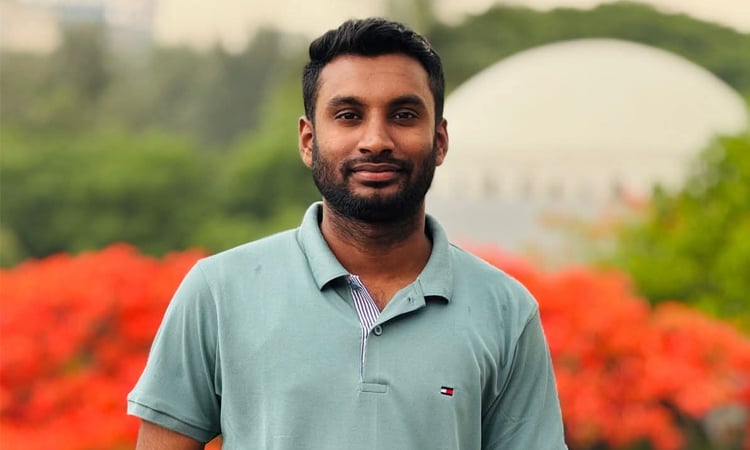News Flash

By Mahamudur Rahman Najid
DHAKA, July 18, 2025 (BSS) – Mehedi Hasan, a student of the Department of Management (2020–21 session) at Kabi Nazrul Government College, was a frontline fighter during the July Uprising.
The youngest among six siblings, Mehedi comes from a modest family in Kachua Upazila of Chandpur district. His father is a migrant worker and his mother is a homemaker.
Despite his modest upbringing, Mehedi emerged as a bold voice in the fight for democracy and self-determination.
In an interview with Bangladesh Sangbad Sangstha (BSS), Mehedi reflected on his journey and the significance of the movement.
BSS: What was the core inspiration behind the July Uprising?
Mehedi Hasan: Our primary inspiration stemmed from the suppression of freedom of speech. Under the fascist regime, we couldn’t speak freely or protest. Whenever we tried to raise our voices, we were met with obstruction and repression.
Our spirit of resistance was born out of the quota reform movement. What began as a protest for fair opportunities evolved into a broader anti-fascist struggle. We saw our brothers standing unarmed in front of bullets for their right to speak. That gave us courage.
We began to believe that we, too, could bring down this autocratic rule. The blood of martyrs like Abrar Fahad became our source of strength. Their sacrifice, bravery and pursuit of justice inspired us every day.
BSS: How did the July Uprising begin?
Mehedi Hasan: The movement originated from the renewed push for quota reform. Though the first phase occurred in 2018, the government’s attempt to reintroduce the old system in 2024 reignited the protest.
When a talented student from a poor background is pushed aside due to an unfair quota system, while someone with no merit advances through familial privilege, it shakes the conscience of the entire nation.
BSS: How did the movement begin on your campus?
Mehedi Hasan: Initially, the July Uprising was limited to our campus. The general public didn’t quite grasp its significance. But over time, it evolved into a nationwide movement, drawing support from across the country.
I joined the protests in early July. On July 7, we formally launched the movement at our campus. Some senior brothers told me, “Mehedi, this movement needs you.” Soon after, I was added to the coordination group by central leader Hannan Masud bhai and began participating regularly.
BSS: How many were martyred or injured from your campus?
Mehedi Hasan: Three of our college students were martyred: Kawsar Bhai, Jihad Hossain Bhai, and Omar Faruq Bhai. Two were my seniors and one was my classmate. They were on the frontlines from the very beginning.
BSS: How did you resist the attacks and obstruction by Chhatra League? Were you personally targeted?
Mehedi Hasan: On July 8, Chhatra League first attempted to suppress us. They took me to their dormitory and physically tortured me. But even then, I didn’t stop. We changed our strategy and operated the movement from friends’ or relatives’ homes when needed.
BSS: How did you communicate with the central leaders and Jagannath University?
Mehedi Hasan: We stayed in touch with Nur Nabi Bhai and Maksud Bhai from Jagannath University. We received instructions from central leaders through WhatsApp and Messenger groups.
Sometimes, due to safety concerns, we would change the timing of our programmes. For example, if an event was scheduled for 12 pm, but Chhatra League announced a programme at the same time, we’d move ours to 3 pm.
BSS: How did you communicate during the internet shutdown? Did student organizations support you?
Mehedi Hasan: Even during internet blackouts, we stayed connected via phone. Some student organizations helped us. Islami Chhatra Shibir made banners for us, while Chhatra Dal brothers offered both financial and moral support.
BSS: What role did social media play in the movement?
Mehedi Hasan: Social media was our strongest weapon. Seeing our brothers bleeding on the streets gave us immense courage. Through Facebook, we received updates even from the remotest parts of the country. Even when the internet was down, we collected footage and shared it later which greatly boosted our morale.
BSS: What was the most challenging moment during the uprising?
Mehedi Hasan: On July 19, during a protest rally from our campus, two of our brothers were shot at Ray Shaheb Bazar in Puran Dhaka and many others were injured. I was also wounded, and five fellow activists were arrested. That was a truly critical moment for us.
BSS: Did you or your family face any personal threats during the movement?
Mehedi Hasan: Initially, my family was very worried. But my second eldest brother Hasan Mahmud, who lives abroad, told me, “By pushing you before the police firing on streets, we are making sacrifices for the country. We want the people to regain their freedom of speech.” Those words gave me the greatest strength.
On July 19, I traveled from my village home to Dhaka in an ambulance to join the protest. When our brothers were being shot, there was no room left for fear.
BSS: When did you face the most severe clashes with the police?
Mehedi Hasan: The fiercest clash took place in front of the Ray Shaheb Bazar court. Another intense encounter happened in Lakshmi Bazar, where one of our brothers was martyred and many, including me, were injured.
BSS: What message would you like to give to the youth of the new Bangladesh?
Mehedi Hasan: I was the campus coordinator during the uprising. Despite immense obstacles, we managed to overthrow a dictatorship. That is our greatest achievement. To the youth of this new Bangladesh, my only request is: never bow down your head to injustice.
BSS: What is the current political coexistence like on your campus?
Mehedi Hasan: Previously, one student organization held dominance over our campus. But now, all political groups are working together. This is a true example of political harmony.